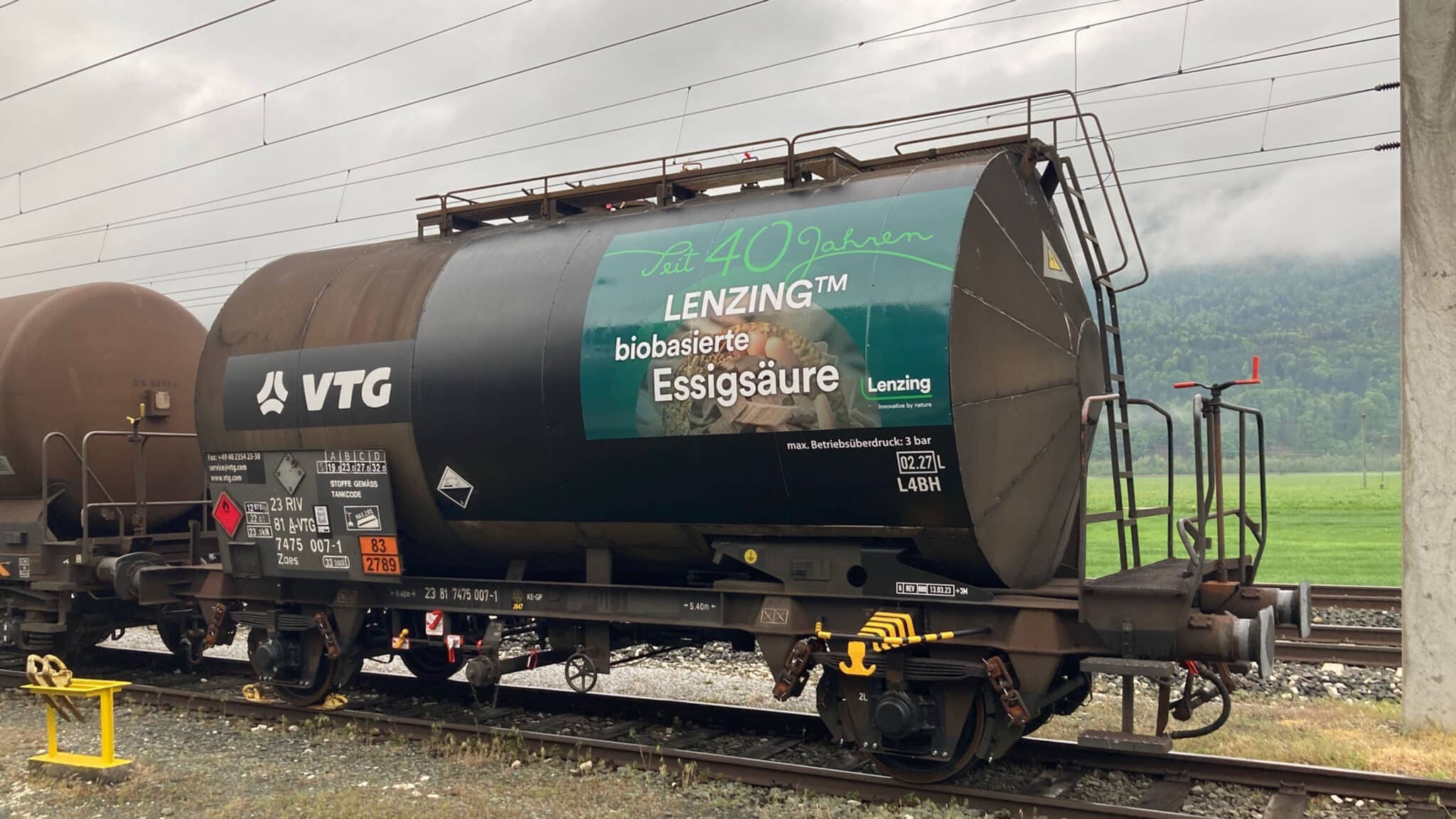Four decades of renewable resources
Evonik’s Active Oxygens business line has been sourcing biobased acetic acid for its peracetic acid production in Europe since 1983.
On May 4, 1983, a tank car left the production site of Lenzing AG in Lenzing, Austria, bound for Evonik’s facility in Weißenstein, just over 200 kilometers away.
The cargo: biobased acetic acid. Acetic acid is a main ingredient in peracetic acid, a versatile industrial substance produced and sold by Evonik’s Active Oxygens business line for a variety of chemical and disinfection applications.
The other main ingredient in peracetic acid is hydrogen peroxide — also produced and sold by Evonik Active Oxygens. In fact, the Weißenstein plant is where the first industrial production of hydrogen peroxide began in 1908; even today, the electrolysis-based technology is called “the Weißenstein process.”
But on May 4, 1983, a different history was in the making. For that particular tank car was filled with LENZING™ Acetic Acid biobased, produced for the first time by Lenzing Group entirely from renewable raw materials. And Evonik was the first customer for this biorefinery product. It was the beginning of a decades-long partnership between Evonik and Lenzing for the supply of this key ingredient, which continues to this day.
What is biobased acetic acid?
Acetic acid, also called ethanoic acid, is an organic compound that is best known as the main component in vinegar. It is also a natural component of hardwood. As Lenzing Group uses wood as a renewable raw material in its production of specialty fibers, LENZING™ Acetic Acid biobased results as a biorefinery product from extracting pulp. The carbon footprint of this product is more than 85% lower than that of fossil-based acetic acid.
In fact, LENZING™ Acetic Acid biobased is of such high quality that it is USDA certified as a food-grade product. The wood Lenzing purchases as a raw material is certified according to recognized sustainability criteria, such as the FSC® and PEFC standards. And more than half of comes from Austrian forests, with another portion coming from other European countries.
The product’s high quality and renewable source thus made it attractive as a raw material for Evonik’s main peracetic acid production facility in Europe: Evonik Peroxid GmbH in Weißenstein (at the time under Evonik’s predecessor company, Degussa, and today a part of Evonik’s Active Oxygens business line). The geographical proximity between the two Austrian sites also made the supply both practical and environmentally benign, especially as deliveries are always carried out by railcar — a more sustainable option than truck transport.
Teaming up to advance sustainable industry
Evonik and Lenzing knew they were onto something when the first biobased acetic acid was delivered in 1983. Over the last 40 years, the partnership has taken on an efficient circularity: Evonik uses LENZING™ Acetic Acid biobased to produce peracetic acid, and Lenzing uses Evonik’s peracetic acid for their lyocell production.
Peracetic acid is not only a powerful oxidizing agent that can kill bacteria, fungi, and viruses at low concentrations and at low temperatures. It also only leaves acetic acid as a by-product when consumed. Residues of peracetic acid quickly decompose into water, oxygen, and acetic acid. The use of peracetic acid in manufacturing processes is therefore an efficient and more environmentally compatible option than other industrial chemicals.
What is more, Evonik Active Oxygens is pursuing a concrete road map toward climate neutrality at all its production sites — including Weißenstein — by 2040. The Weißenstein site is already well on its way: Evonik Peroxid GmbH has been sourcing the great majority of its electricity from renewable resources since 2021.
The synergies go beyond products. Lenzing’s site is also one of the locations of Evonik Fibres GmbH, where its polyimide chemistry is produced. Based on this chemistry, Evonik Fibres specializes in high-temperature resistant powders, fibers, and membranes for a variety of environmental applications — from hot gas filtration to the biogas separation necessary to produce biofuels. In fact, the innovative products and technologies offered by Evonik Fibres GmbH have been particularly awarded for the CO2-saving potential in their application.
Expertise is a shared resource, too: New employees at Evonik Fibres GmbH and Evonik Peroxid GmbH attend training sessions at Lenzing AG as part of their comprehensive apprenticeship programs.
Evonik Peroxid’s Managing Director, Dr. Josef Miklautsch, visited Lenzing together with Evonik representatives on May 4, 2023 — exactly 40 years after the first delivery of biobased acetic acid — to honor the partners’ long collaboration for sustainable industry. “Prioritizing sustainable processes and utilizing renewable raw materials simply makes good business sense,” he said. “Four decades years of successful collaboration have shown that. And although efficiency and supply security may have been the decisive factors in 1983, today, we are even more keenly aware that resources are finite. That is why we are focused on integrating sustainability along our entire value chain.”
“For 40 years, biobased acetic acid has been one of Lenzing’s key products for the biorefinery segment and is highly demanded and trusted by customers across industry sectors,” said Elisabeth Stanger, Senior Director of Biorefinery & Co-Products for the Lenzing Group.
